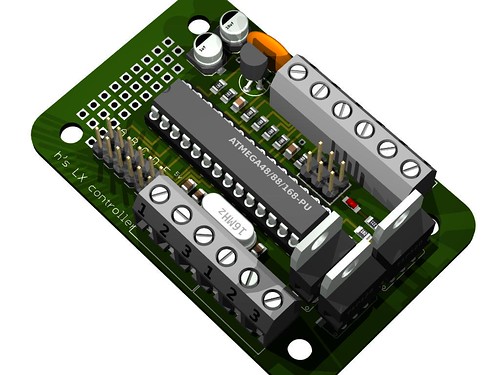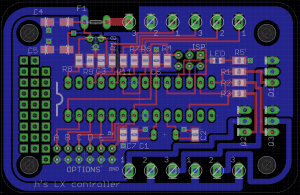
I’ve been putting LED lights up around the house, driven by solar panels. Free light. Yummy. To save precious power, and because they look cool, I like the lights to be automatic – fade up automatically when you enter a room, fade out when it senses you’ve gone. It’s a simple thing to build a circuit to control it all, but it gets a bit tedious building the same circuit over and over again, so I’m getting some PCBs made up.

Just finished the board design. There are connections for:
- 12V in
- PIR (burglar alarm sensors) or a push-button on/off switch
- 3 outputs for 12V LED strips – max 1A each, roughly 2 metres of standard LED strip per channel
- plus some extra input/outputs for hacking.
The basic specs:
- 12v supply – so ideal for car battery and solar panels
- drives 3 channels of LEDs separately – or 1 string of full colour RGB LEDs
- PWM fading with a custom fade curve – lights fade in and out sexily
- Sequencing – have lights fade up or down in sequence when triggered
- senses when the battery/supply is low and reduces light output – “moon mode”
- 4 separate inputs – use with PIR sensors, buttons, switches, light detectors, temperature sensors etc
- onboard self-resetting fuse
- hacker-friendly – it’s arduino / atmega based, so hobbyists can program their own setups
- ISP connector for programming in-situ if that’s your thing
- bonus breadboard area for adding components / input buffers if necessary
- fits in a standard Camden Boss RX2010 box – buy from RS, Maplins, Rapid, Farnell etc
Hoping to sell some. Haven’t worked out a price yet, nor how to market the thing. It’s highly configurable, but that’s a double-edged sword – I think it’s going to be easiest for people to understand if I can give them usage examples. Perhaps:
1. Automatic power-saving lighting system for homes, caravans and boats.
2. Colour-corrected lights for office use
3. SAD light – control the colour temperature to match dawn/dusk or midday sunlight
4. Shops and bars – automatic display lights
5. Industrial use – automatic bathroom / hall lights
6. Wake-up lights for winter use – have your bedroom lights fade up automatically at a certain time of the morning to replicate summer (will require a separately available clock/alarm unit)
Hmm… tricky to know how to approach marketing. I mean, it’s an utterly basic box, just a microcontroller with 3 big transistors, but with the right firmware it’ll do all sorts of handy things. It’ll be a god-send to me, but can I make it sound attractive (and simple) to non-hacker types?